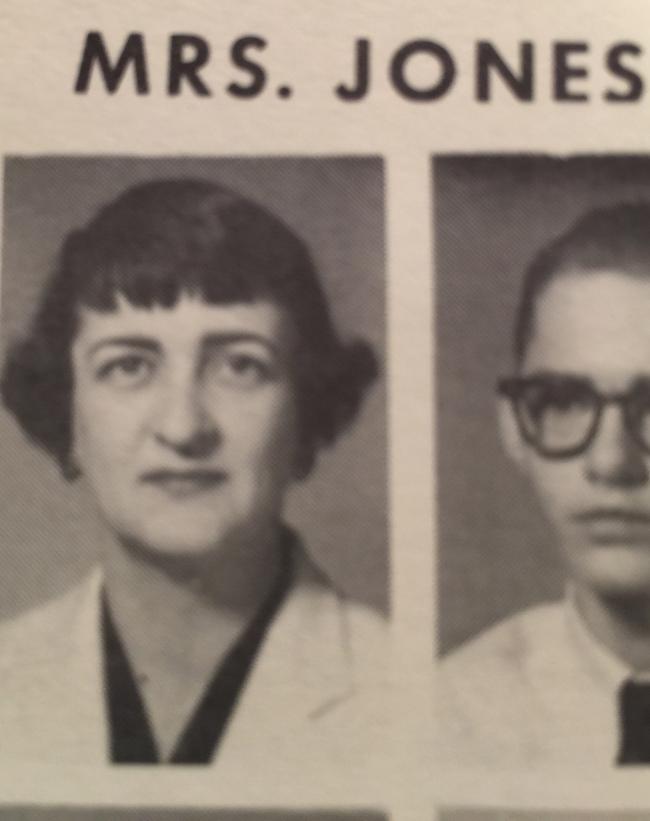A graduate of Madison Junior High on the hunt for long-lost teacher
West Seattle's Tom Herbert is hoping to get more information about his one time teacher at Madison, Mrs. X as he calls her.
Mon, 05/16/2016
By Lindsay Peyton
It was like a message in a bottle, the yellowed, handwritten story Tom Hebert found stowed away in a file box in his storage unit. After discovering the forgotten treasure from his childhood, he embarked on a mission to find its author.
The story was composed in 1953, when Hebert was attending James Madison Junior High School in West Seattle, by a teacher who would change his life and whose impact he would always remember.
Her name, however, had totally faded from memory.
The mystery instructor of ninth grade speech arts penned the piece titled “Beautiful Belinda,” a dramatic reading just for him to perform as a way to practice public speaking.
Hebert saw it as a personal challenge. His ever-supportive teacher agreed to play on piano the sound effects the script required, and he stepped up to the plate.
Hebert said the performance was the beginning of a life in the limelight. He graduated Madison as master of ceremonies for the school’s annual spring show, received his bachelor’s degree in speech and theatre arts at Linfield College and went on to graduate school at the Dallas Theater Center and Baylor University.
Hebert later taught public speaking at Prairie View A&M University, and remained a storyteller and writer. He has worked a stage manager, served among the ranks in the Peace Corps, helped build the USO Centers around the world and has published books, articles and columns.
When he found “Beautiful Belinda,” he started thinking back on how his journey began. “It’s all about the power of nostalgia,” he said. “That’s what’s going on with me. The mind starts spinning in a positive way.”
He said that the mystery teacher saw something special in a short, shy, intense child who commuted to West Seattle on the ferry from Vashon. He wishes he could thank her, send her flowers, give her a hug.
“She should be honored in some way – by me, the school, the PTA,” Hebert said. “This lady loved me. She found something in me, and I’m so honored. It’s a special thing a teacher can bring.”
Seattle Public Schools collects educational records dating back to the 1860s. “People can come, look at their grandparents’ records, newspapers and yearbooks,” archives manager Aaren Purcell said.
The collection has appealed to genealogists, historians, educators and individuals who want to get a sense for what the schools of yesteryear were like. The resource is open to the public on Thursday and Fridays – and includes art, artifacts, minutes form school board meetings, textbooks, student newspapers, district publications, newsletters and annual reports.
A book in the archive entitled “Buildings for Learning: Seattle Public School Histories 1862-2000” by Niles Thompson and Carolyn Marr tells a brief history of James Madison Junior High. Land was purchased for the school in 1927, the building opened in 1929 and expanded in 1931 with the addition of more classrooms. The first principal J.W. Scudder held his position until 1956.
The school paper the Madisonian ran from 1930 to 1951. Starting in the 1940s, the school sponsored several annual events, most notably the Christmas Assembly and Spring Concert. In the mid-1960s, both events were so popular that 1,000 tickets sold out in three days.
In 1950, Rosemary S. Jones appeared as a new teacher in the Madisonian – and was still on the school staff when Hebert attended.
Another Madison graduate Patricia Spangler thinks that Jones may be the one “Mrs. X” as Hebert calls his long-lost teacher. Spangler found Jones’ name listed as the speech teacher still in 1962 and remembers her as the one in charge of both the Christmas and spring programs at the school.
Unfortunately, Hebert admits that the name does not ring a bell – and would not know it if he heard it.
Regardless, he believes that it’s worth recognizing the huge impact individual teachers can make on a student.
“How do we honor our teachers? Maybe this will start something,” he said.
The school’s principal Robert Gary said that the story of an amazing teacher on campus fits the bill at Madison.
“We have generations of families who have sent their kids here,” he said. “To see the parents who attended send their kids here lets the staff know they are doing an outstanding job.”
Gary also believes in the importance of upholding the campus traditions – and in paying homage to the staff that came before. He said that if Hebert unearths the name of his speech teacher, the school will do something about it.
“If we get that information, we’ll find some way to honor her,” he said. “We’ll definitely do that.”


